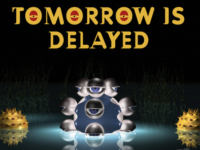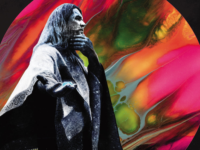JuJu’s La Que Sabe (She Who Knows) is a dark pulsing psych-rock soundtrack to scientific search into the beginnings of the universe, just as the way-too dense big bang matter flashed a salvation flicker of rock ‘n’ roll light.
Just so you know, JuJu is the brainchild of Gioele Valenti, returning with a rather dark (yet always beautiful!) third album. To toss out references: La Que Sabe is a lovely cosmic salad of Joy Division, Dead Can Dance, Faith-era Cure, early Bevis Frond, and a revved-up Can, circa Future Days. Yeah, this is music that does shake the moon a bit.
“Not This Time” begins with weird laughter but then suddenly throbs with dense gravity, as electric guitars probe autumnal constellations. Gioele’s vocals are filtered, like old radio waves sent from a forgotten planet, and the programmed drums work simply because they create a continuous stampede that never attempts to be anything other than a tense heartbeat. And that electric guitar continues to rip into the tapestry of a starry night.
“Nothing Endures” slows the pulse a bit. The tune ups the eerie quotient, and touches on the specter of Blue Oyster Cult. But again, the song simply grinds with a dark lure of any Siren’s charm, while the guitar touches a sublime rock ‘n’ roll thought that gets (sort of) funky in a way that, as said, shakes the moon a bit.
The whole album thrums with a dark and melodic mantra matrix. And, as my friend Kilda Defnut often asks: “Anyone for dark and melodic mantra matrix tennis?”
Of course, there are more dense sounds on JuJu’s La Que Sabe. The beginning rudimentary bass pulse of “Could You Believe” yields to the sonic beauty of a spiritual instrumental backing, a prayerful vocal, and an electronic vibe that touches those autumnal constellations once again. Sure, the dead can dance, but this tune can make everyone else, to quote the B-52’s, “do the shy tuna.” Really, the tune has the very same minimalistic infectious heartbeat as the Cure’s “All Cats Are Grey” from Faith.
Then, “She’s Perfect” continues the dense dance-floor urgency and gets into the New Order’s post-punk sonic fisticuffs with all the Power, Corruption and Lies. It’s a lovely and heady broth. Odd, the music swirls with a cosmic spin, which is juxtaposed with an almost shamanistic earthy chant. The same is true for “Walk in Line,” which manages to float musical helium into the dense post big bang (to mention that again!) hydrogen carved into these grooves.
A bit of doom and gloom follows with the ethereal “Days in the Sun” that could (almost) be a Pink Floyd tune from the first side of their Meddle record, with very aged and very Mediterranean echo of a song like “One of These Days.” JuJu throttles back on the tough rock fuel and hovers (for more than six minutes!) with a moody ghost’s memory.
This is a beautiful ephemeral contrast to that dark and melodic mantra matrix of the rest of La Que Sabe, and (to get all mythological!) it’s the sound of a suspended Eurydice as her eyes met the forbidden glance of her lyre-strumming husband, Orpheus.
And, finally, “Beautiful Mother” plays the epic tarot card with a razor-sharp guitar that frames a big distorted vocal that sings with a haunted knowledge of some vague warning from yet another unrepentant soul in the underworld who, to quote Bob Dylan’s song “I Shall Be Released,” is “crying out that he’s been framed.” The song quietly erupts with psych lava that drips with a very molasses dipped heavy eastern flavor.
As (the great) David Byrne of Talking Heads’ fame once sang, “This ain’t no party, this ain’t no disco, this ain’t no fooling around.” Indeed. JuJu’s La Que Sabe is that (before-mentioned) soundtrack to the very moment when the nascent universe flickered, with the votive candle mystery, and leaked the light of a pretty great hard-psych rock ‘n’ roll backbeat melody.
- Coincidence – ‘Coincidence,’ ‘Clef de Ciel’ + ‘Archives 1973-1974’ (2024) - November 17, 2024
- Mile Marker Zero – ‘Coming of Age’ (2024) - October 14, 2024
- Burton Cummings – ‘A Few Good Moments’ (2024) - October 7, 2024




